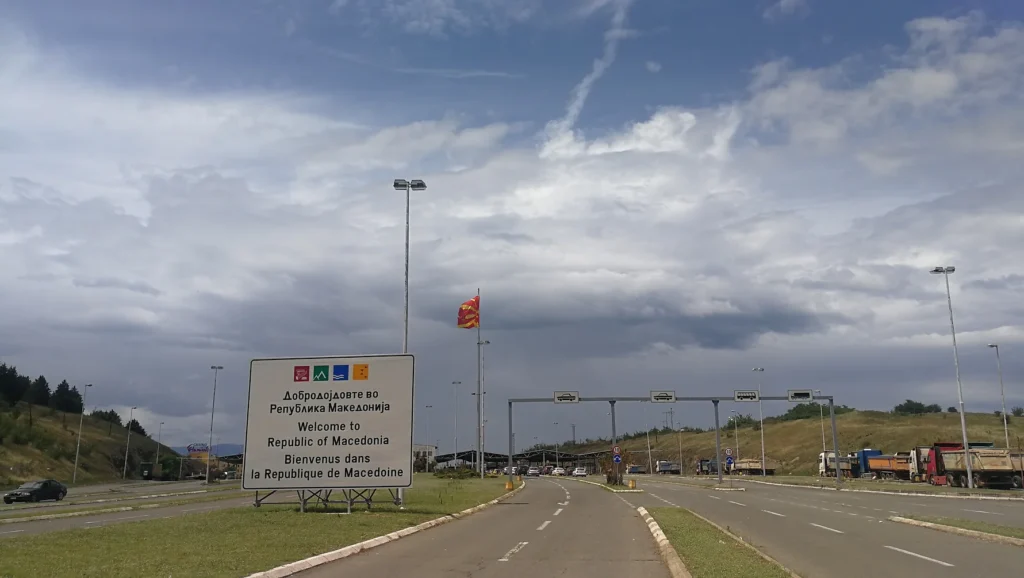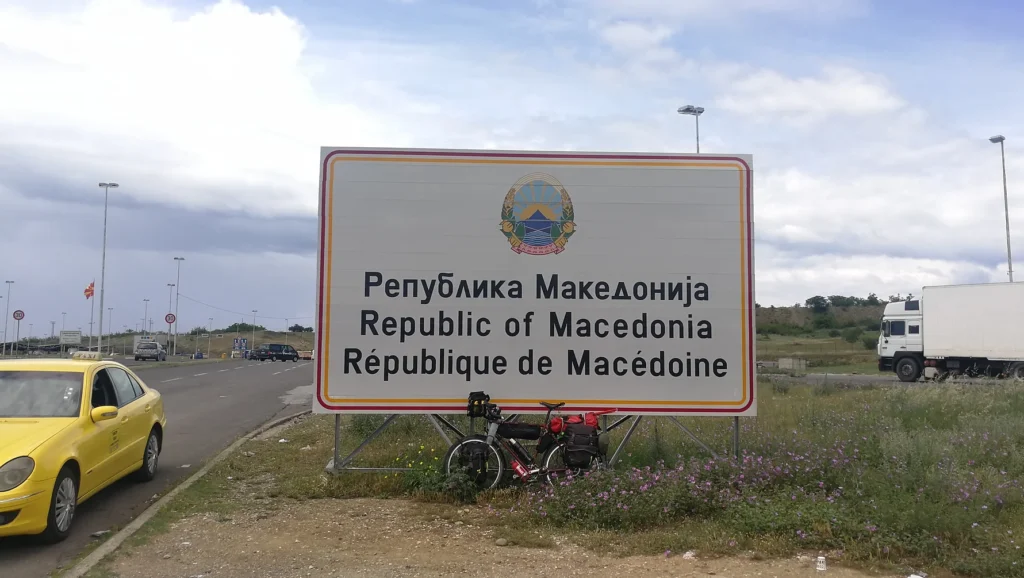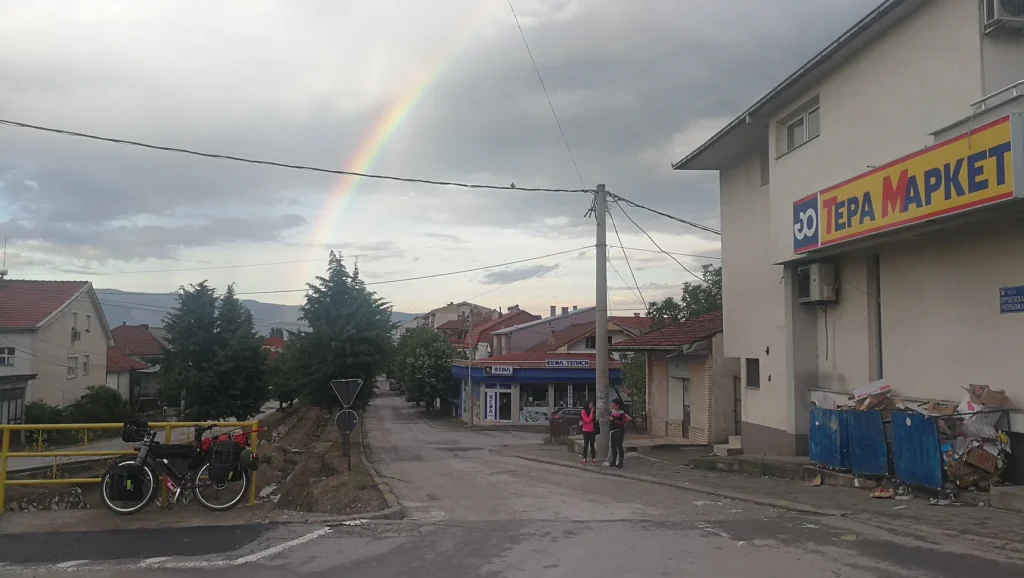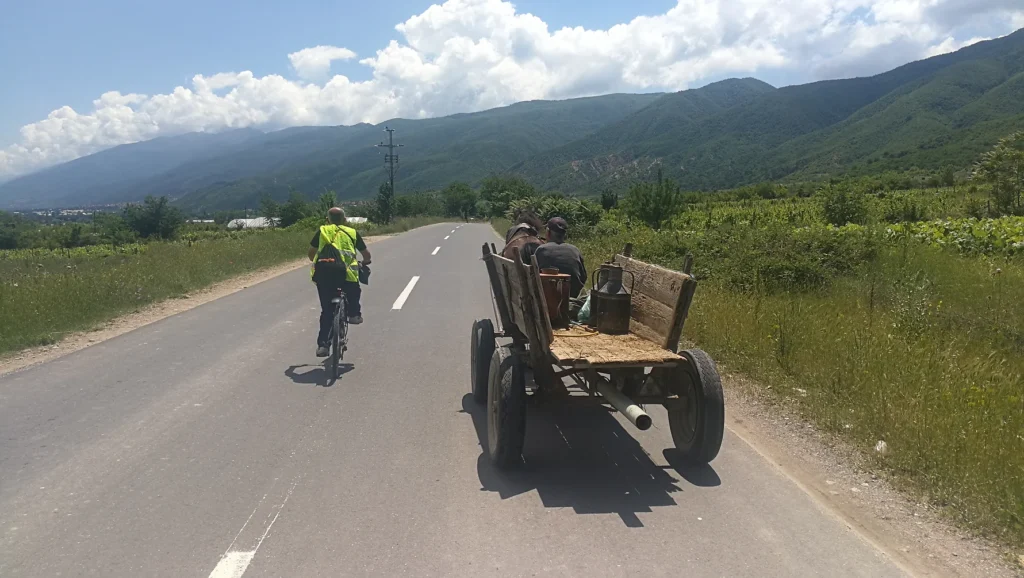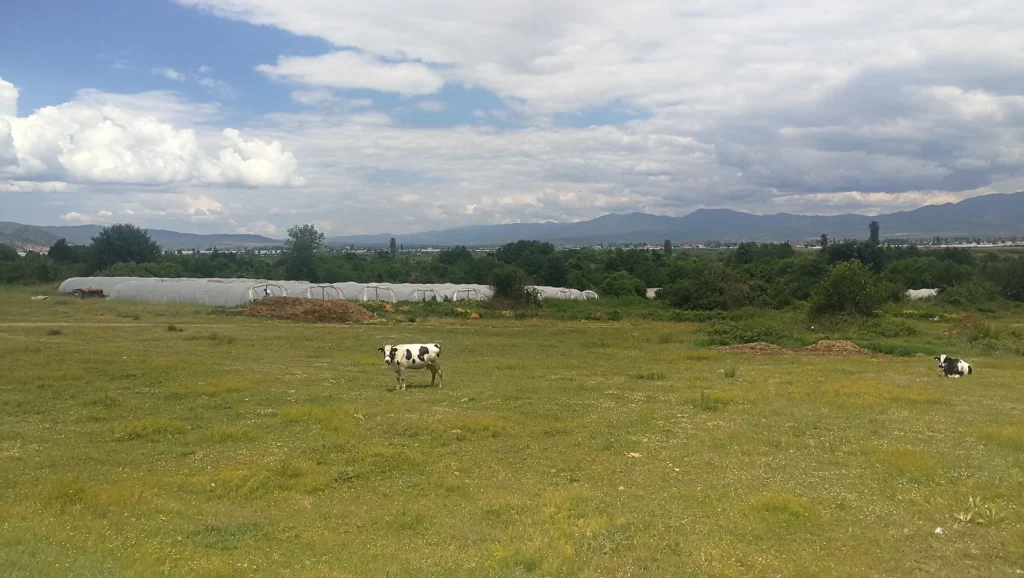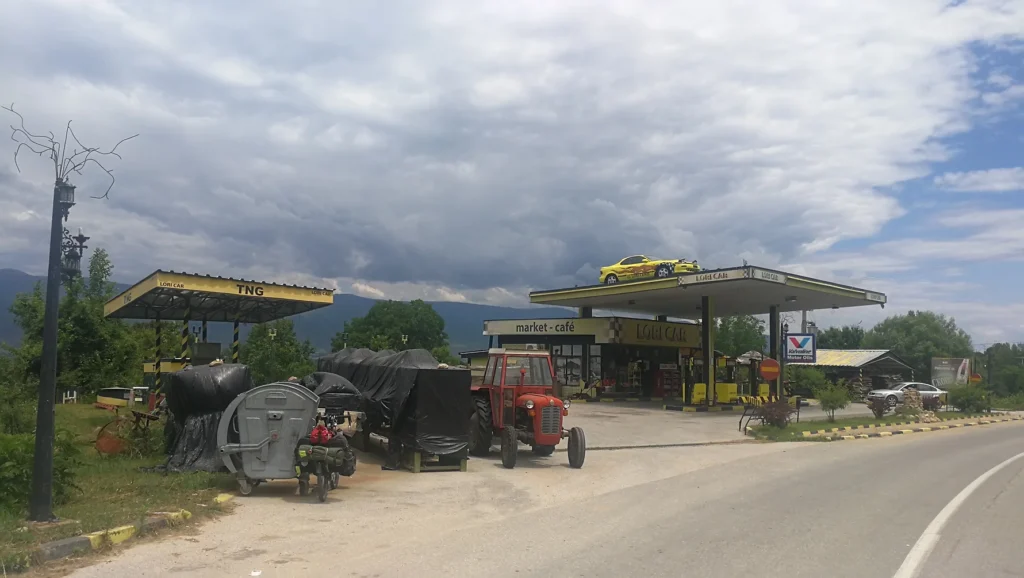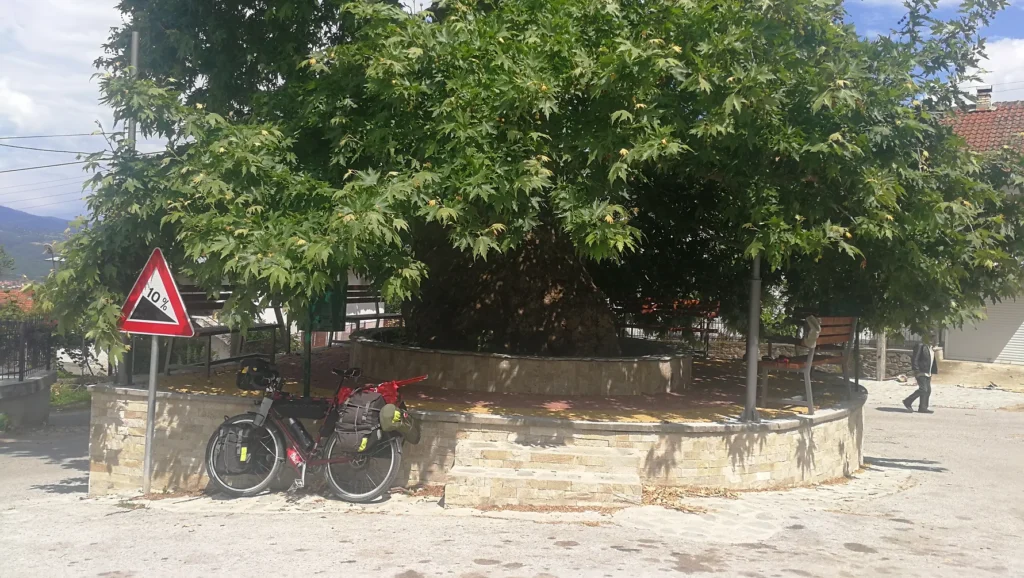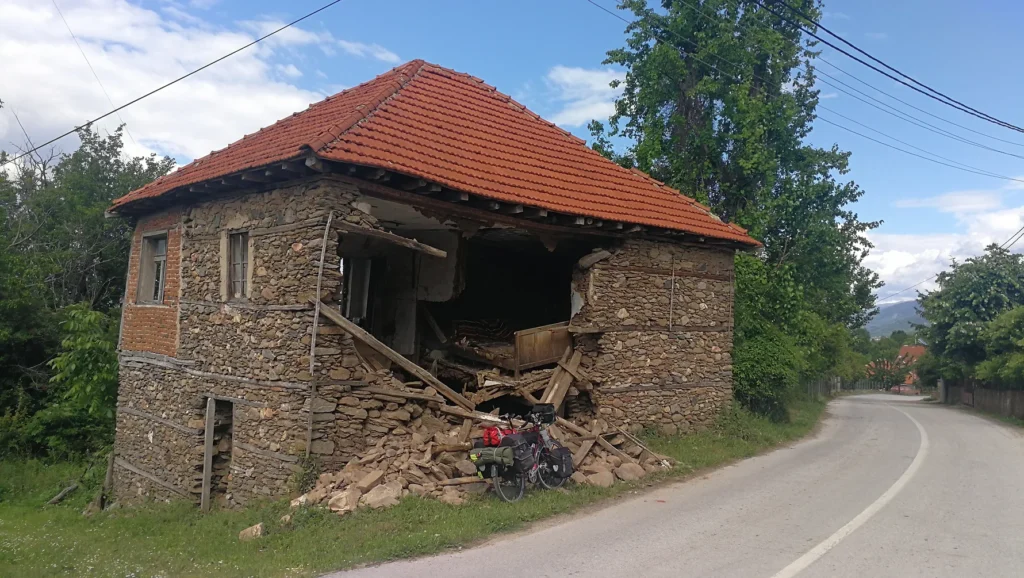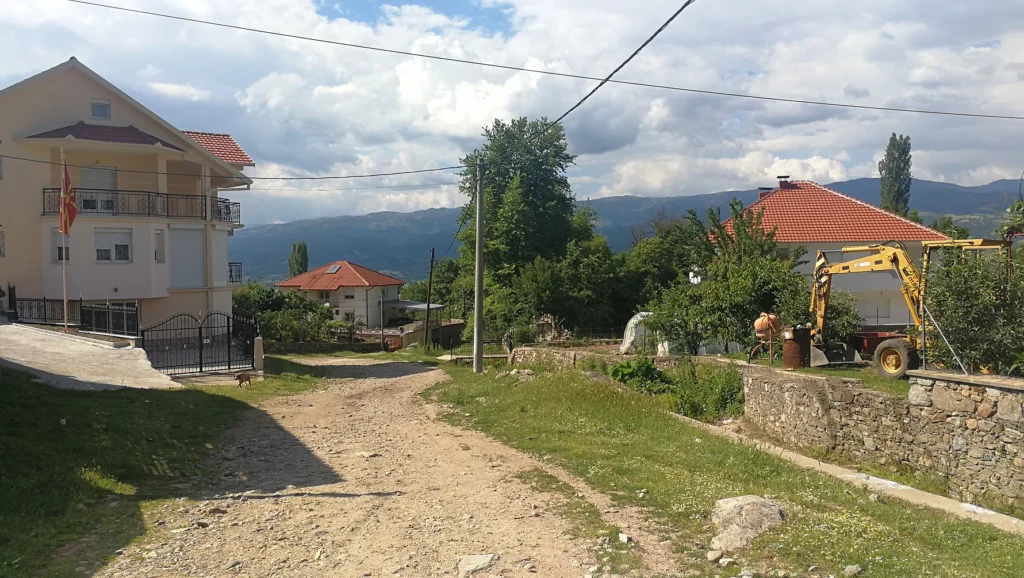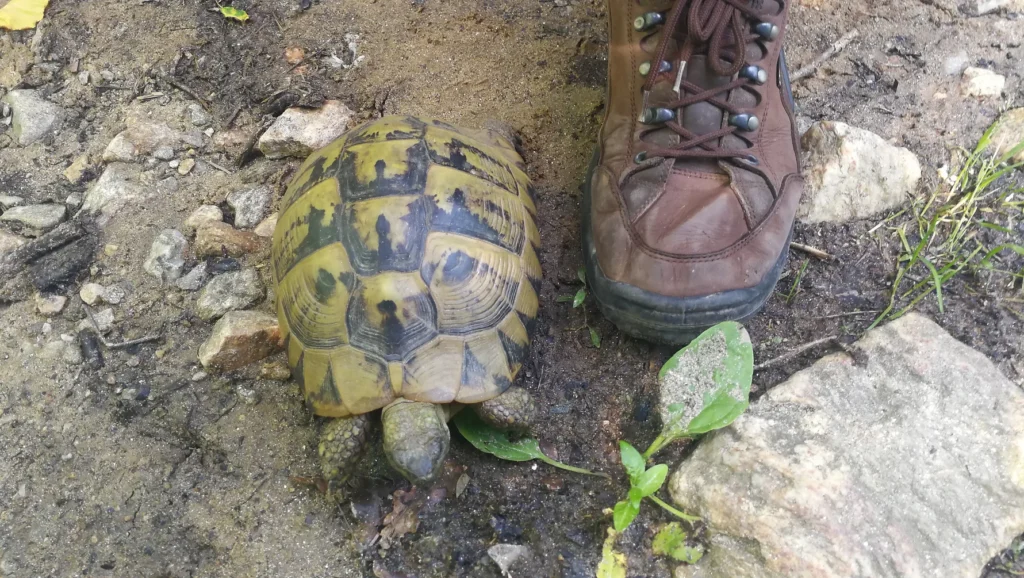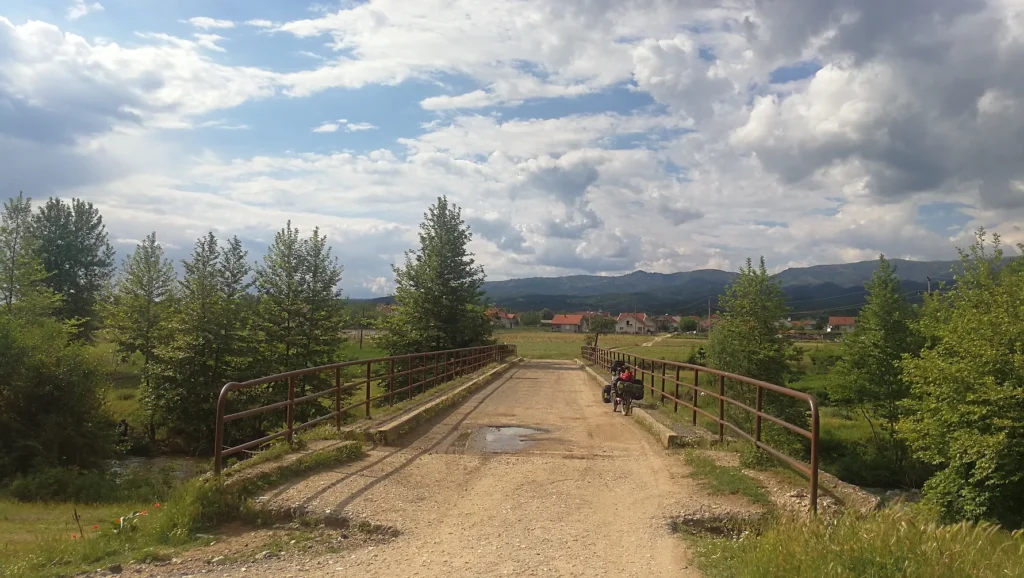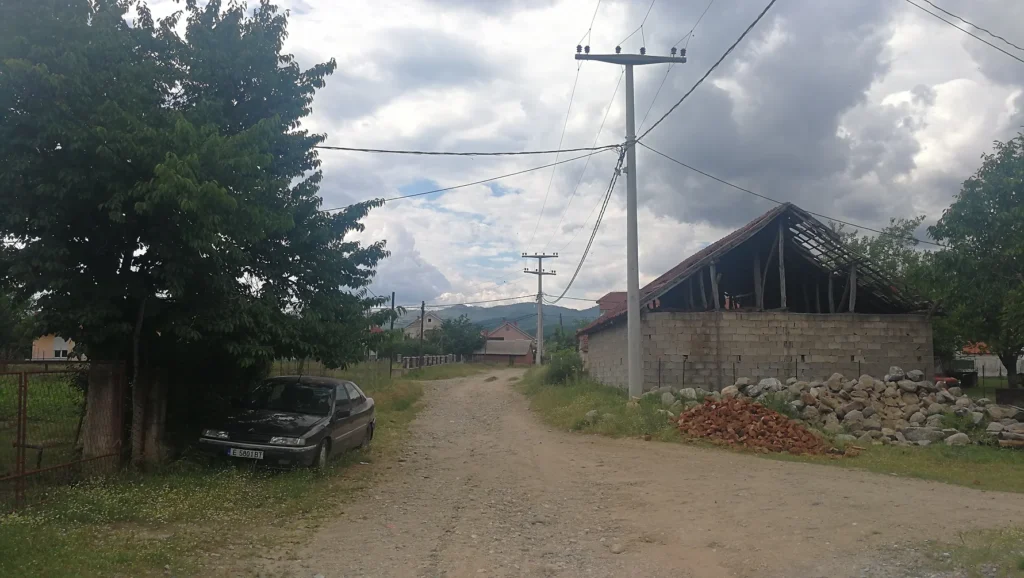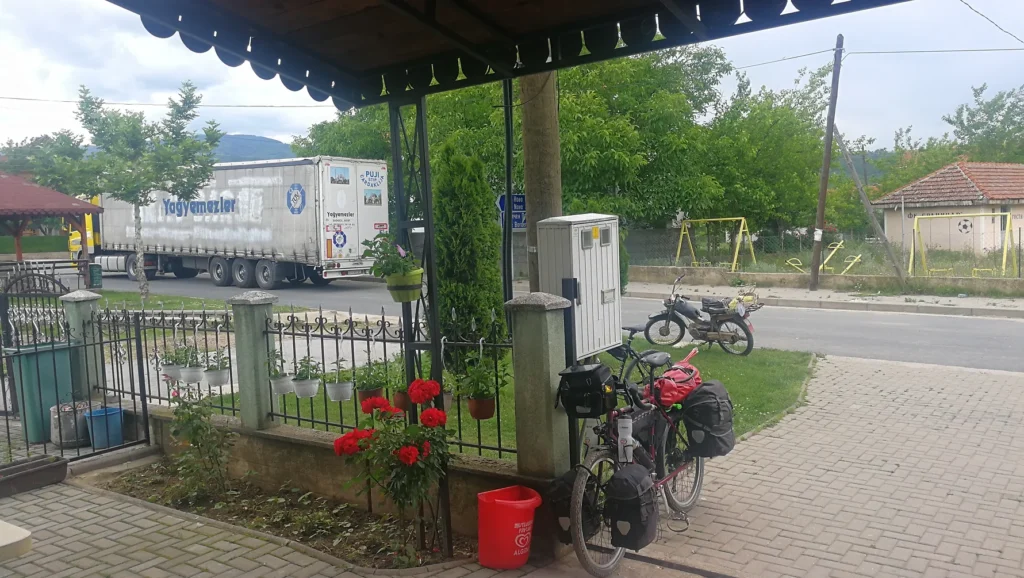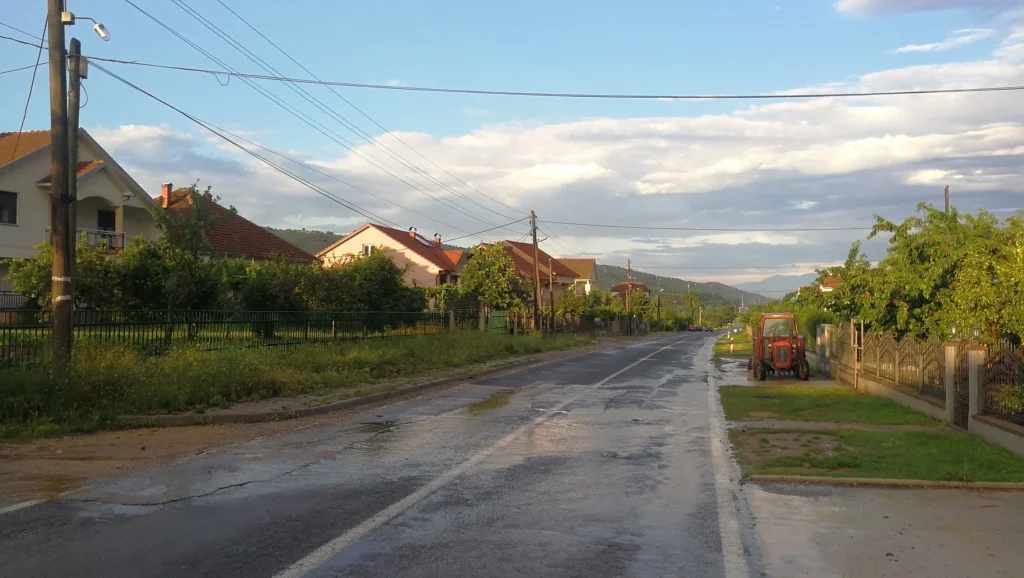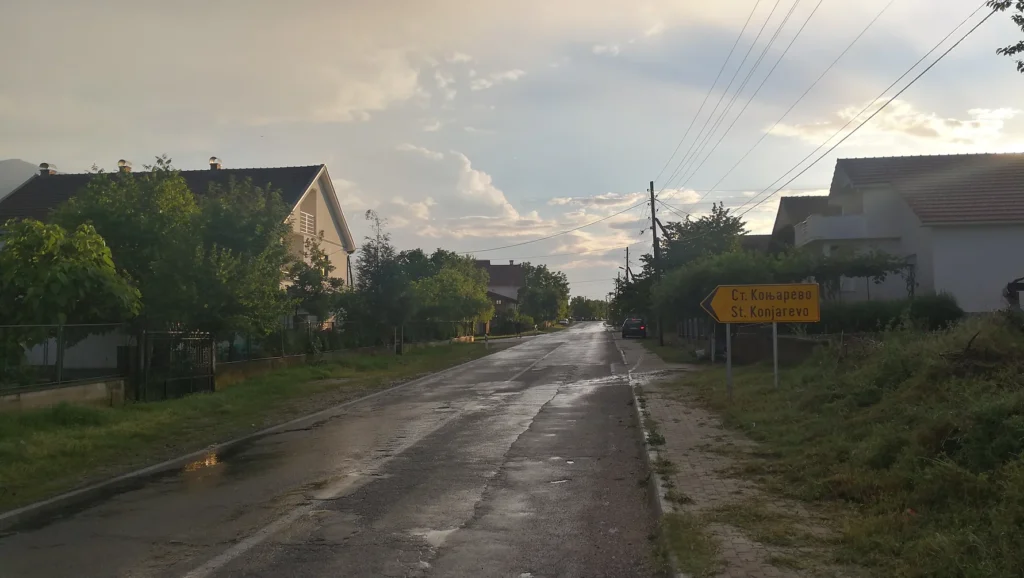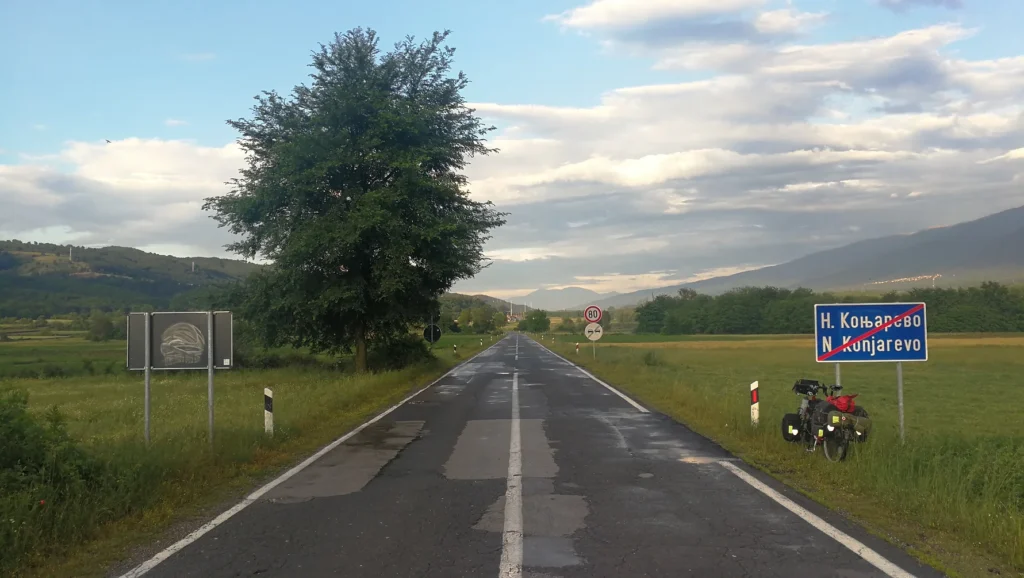North Macedonia — Humanity
I reached the border of Macedonia at noon – the country has meanwhile changed its name from “Macedonia” into “North Macedonia” to settle a naming conflict with Greece.
This young republic declared its independence from Yugoslavia in 1991 and is currently negotiating EU membership. With diverse connections to its neighboring populations living in Albania, Bulgaria, Greece, Kosovo, and Serbia – today’s North Macedonia is a truly multi-ethnic society.
Professional border crossing procedure, friendly first impression.
Five minutes after entering Macedonia I got checked by the military police – they explained many refugees came this route by bike. In the border region I also saw police vehicles from Germany and Poland, probably supporting border controls.
In 2015, hundreds-of-thousands of people took this border crossing, many of them fleeing from the Syrian civil war. Gevgelija train-station at this border crossing was on global news with images of thousands of stranded refugees.
Overall in 2015, about 1 million refugees and migrants came to the EU and an estimated 860,000 took a route through Greece. North Macedonia – a country with only 1.8 million inhabitants – declared a state of emergency as it was overwhelmed by the large number of people.
Learning that many refugees came this route by bike made me feel like a stupid white privileged German passport holder on a self-focused adventure trip.
This is from a United Nations article published in 2015:
“Sheltering from the heat, a young couple from Syria sits among the trees near a busy highway that cuts through The former Yugoslav Republic of Macedonia (fYROM). Siba and her husband, Fahad, are travelling among a group of roughly 30 Syrians.
Their rickety push-bike may have squeaky gears and a bum-bruising saddle, but it is the only route they have to healing Siba’s scars. She balances on the bicycle’s frame as Fahad pedals – cars, taxis and trucks thundering past.
The haphazard biking troupe is journeying north from the Greek border towards the frontier with Serbia. On the bike she must wear an ankle brace, but when they stop for shelter she gives the skin around her feet some time to breathe.
“I was injured by a very large mortar bomb,” she explains with a smile, her eyes cast down at her tattoos of war. “I have shrapnel wounds all over my body. This journey has been long and very difficult, but I will not stop until we are finished. Of course it is difficult for Fahad to cycle with me on the bike but this is what we must do, we cannot go back to Syria.”
Shouldn’t I do something more constructive in my life than cycling for pleasure where other people flee war, hunger, frost, poverty, and danger-to-life?
But then again perhaps everything has it’s time. For years I had worked as a sustainability and ethics researcher. And after the bike tour I would again do something directly productive for society – I didn’t have a plan for what I would do after my return.
I had decided to not set an end date or location for my tour – I wanted to take decisions one day after another, listening into my feelings, making space to find some answers inside.
What I had planned was reaching Istanbul and then cycle a route south of the Black Sea and the Caspian Sea. You can take cool northern routes to East Asia too but for me a southern route variant had the attraction of more mountains.
After Central Asia my planning horizon ended. I was aware from there you can generally cycle northeast (Kazakhstan, Russia, Mongolia), east (China), or southeast (Pakistan, India, Nepal) – but for the moment my only blurred goal was reaching East Asia cycling overland.
I didn’t spend much money – as a cycle tourer your transportation is free and your accommodation is also free when you wildcamp. Over the entire tour, I wildcamped or got invited by locals in about 7 of 10 places I slept. When I paid for accommodation, I stayed at campsites, hostels, or whatever cheapest option was available.
In the first tour half, I leaned towards wildcamping and slept in paid accommodation only in exceptional circumstances (e.g. bike problem, safety concern, mountain hut, injury, border crossing town).
In the second tour half, I stayed a bit more in paid places as I realized the many benefits of making more human connections on the tour (e.g. exchanging route tips with other travelers, connecting with locals in family-homestays).
Beside traveling and sleeping (which are basically free), costs for eating are also minimal when you self-cook most meals. With 1 liter of gasoline you can cook for about week (less in cold conditions when you make more tea) and how much can you possibly spent buying rice/lentils and some vegetables? Averaging over the entire tour I would estimate I spend about 12 Euro/day on running living costs – excluding one-time costs (e.g. visa fees, spare parts).
Traveling on a small budget eased my moral concerns but still one voice in my mind said “you are on a self-focused bike trip” while another said “it’s ok that at this time in your life you cycle”. Which voice was right?
I listened into my feelings and found a warm “this tour feels right” – at this time in my life, I was riding.
I didn’t see any refugees in North Macedonia but I thought about them a lot and imagined their journeys. How many of them have lost family members? How many come traumatized, raped, injured, or homeless?
Perhaps humanity is what our meditation attention should be calibrated on. Perhaps the answer was simple.
Sure we live our life embedded in a fascinating universe and we can ask ourselves existential questions. But we also live our life on earth embedded in a network called humanity – and we live today.
I got local currency at an ATM and then cycled over a small pass at Kosturino. Did the refugees from Gevgelija trainstation come this way?
In the fields in the countryside I saw fresh piles of onions. It must be their harvest time but already at the end of May? I know nothing.
Today I didn’t feel like taking many pictures. The only picture I took was a rainbow in the evening.
In Strumica I checked into a hotel. As a last greeting from my old life, I had to do some administrative work related to my former ethics professor job and for this I needed internet and electricity for some hours.
How can ethics be taught well?
I’m just a cyclist but in my world concept the number of human civilizations on earth is one – we are one big human family. And the world belongs to us on an existential level – we create our reality together in our consciousness, and we are able to jointly change our reality with our consciousness attention.
This logic applies generally: when we decide to calibrate our consciousness attention to whatever other direction we like to focus on, the next version of our reality adapts accordingly. And we shape our reality not only by choosing the direction of our consciousness attention, but also by choosing the underlying emotional flavor of our attention.
Let’s look at the example of refugees. If it feels right, we can decide to change our consciousness attention towards paying more attention to humanity and see refugees as individual humans like you and me.
And if it feels right, we can choose an underlying emotional attention flavor of compassion.
When we make such exemplary attention adaptations in our consciousness – then one time step later the world will have developed a notch more humanity- and compassion-focused, relative to the world’s previous trajectory.
“Does that logic hold?” you may ask. Good question, why should our chosen consciousness attention have the power to change the world?
A philosophical answer could begin with “if we understand reality as something emerging in our consciousness …” – but here we would quickly get lost in definitions and underlying assumptions around existential philosophy.
A feeling-based answer is easier, or better a question: how does the idea feel that your chosen consciousness attention shapes the reality around you?
But where do we start and where do we stop? It’s easy to moralize and say things like “we should pay more attention to humanity“, “we should pay more attention to nature“, or to generally come up with a long list of well-meant attention directions across all topics we jointly discuss in humanity’s current zeitgeist.
Your consciousness is yours alone! Everyone has individual values and opinions on things, and that’s perfectly fine – you are existentially free inside yourself to “stop” your consciousness attention from going anywhere if you don’t feel like it.
Perhaps the more pragmatic question is “Where do we start?”. The attention inside our consciousness doesn’t need so much “making” and “choosing” and “controlling” – that reflex is a natural part of our consciousness, but it’s just one part.
On the other side is our letting-go. And for this, all we need to do is sensing into our consciousness without expecting, analyzing, or judging … so we can feel our true self.
Let’s assume for a moment that we have a reality-bending force in our consciousness. What do we do with it?
I would say our attention calibration evolves naturally. We were all already born with an attention-calibration stream constantly running in the background of our consciousness – the force to shape your reality is already inside you.
What if we decide to use the reality-bending force inside us more consciously?
Human consciousness journeys are probably too diverse for anything like “steps” or “techniques”, but with this disclaimer in mind perhaps the following ideas help some people to get a better grip on their force.
First, we need to develop our general ability to feel our force before being able to use it in a more conscious way.
Again thinking backwards, I would say what we need to achieve as context factors are probably things like “meditative stability” (our mind stops racing), “consciousness clarity” (perceiving clearly), “consciousness tranquility” (being truly calm), and perhaps above all achieving “inner freedom” (integrating our deepest fears) – the more we achieve being in a consciousness state like that, the more we can feel and use our force.
Second, after we have developed our ability to feel and use our natural reality-bending force, we can start to use it more consciously.
I don’t believe consciousness journey’s ever follow such simplified steps – our “force awareness” and “force usage” seem to be interwoven in many ways in real life.
In the hotel in Strumica I needed to do some work regarding the ethics course I had taught – the course focused on student’s self-reflection.
How can ethics be taught well?
I think teaching ethics should generally be limited to the first step of helping people to develop “force awareness”. How people then decide on their “force usage” is up to them.
So regarding your personal usage of your reality-bending force … completely up to you.
But perhaps we can speculate on “force usage” aspects we all have in common. The one thing we probably all share is that we follow a life path that feels individually right for us given the current reality of our life – isn’t our consciousness attention always calibrated like that?
Breathing in, breathing out.
I followed the Strumica river which springs in North Macedonia’s Plačkovica mountains and flows eastwards towards Bulgaria.
The river has created a fertile soil and made Strumica the agricultural center of North Macedonia. About 180,000 tons of vegetables are produced in this river basin yearly – mostly peppers, tomatoes, watermelons, cabbages, and cucumbers.
Apparently North Macedonia’s farmers relied traditionally on chemical fertilizers and pesticides to boost production but they now develop sustainable farming practices such as systematic crop rotation, fertilization based on soil tests, and drip irrigation systems. Pretty cool.
In 2005 North Macedonia made EU membership its top strategic priority and in 2009 a World Bank study ranked 178 countries regarding their development towards good economic and social practices and North Macedonia got place four.
Overall, this country has received much praise for making progress in record time – people here have apparently decided to change their reality towards a direction they like better using their collective reality-bending force.
In the center of the small village Smolari I took a break under a massive plane tree surrounded by benches. There was a little kiosk nearby and I imagined the locals meeting up under this tree in the evening to chat about life and connect.
Human connections – how much do they give our life meaning?
All our fellow human brothers and sisters live in the same human condition like us – they have a consciousness and they co-shape our collective reality through their chosen consciousness attention.
Perhaps a part of life’s meaning can be found in having compassion for others, remembering that we are all existentially the same.
Thinkers about conscious exploration sometimes warn that when we meditate and go deeper inside we will only find our own egoism as long as we don’t love other people and the world around us. Some thinkers even frame transcendence as something that can only be reached by giving compassion.
I took the smallest roads I could find cycling towards the border. You always see much more of people’s local life that way.
I also prefer backcountry roads as they increase chances to see animals. The wildlife is generally shy but occasionally you make a friend.
After a short stretch through a forest I crossed the Strumica river and cycled into Novo Konjarevo, the last village before the border. Pretty relaxed atmosphere, few people around.
A thunderstorm caught me close to the border so I decided to chat with locals under the roof of a kiosk for two hours until it passed. We talked about refugees and the locals were really positive about them and said “no problems”. People in North Macedonia are human and warm – people in North Macedonia are cool.
After the thunderstorm the sun came out. What other goodbye would you expect from a country carrying the shining sun in its national flag!
On the last stretch towards the border I was alone on the road but I basically was alone on the road wherever I cycled in this country – excellent conditions for cycling meditation.
North Macedonia, thank you for the impulses on humanity. Our “force usage” will always remain our free individual choice – but at the same time we constantly choose while being a part of humanity’s collective zeitgeist.
Perhaps it’s a good idea on our further consciousness expedition to keep an eye on other humans and the possibility to find meaning in human connection … before we get lost in existential philosophy.
